Introduction
Navigating the complexities of hormonal health can feel overwhelming, especially when it manifests as unwanted abdominal fat. Hormonal belly, a condition that affects a significant number of women during pivotal life stages, is not just a cosmetic concern; it signals deeper hormonal imbalances that can impact overall well-being. By understanding the underlying causes—such as stress, diet, and lifestyle choices—individuals can take proactive steps toward reclaiming their health.
This article delves into effective strategies for managing hormonal belly, emphasizing the importance of nutrition, exercise, and mindfulness. With the right tools and support, it is possible to foster a healthier relationship with one's body and promote lasting wellness.
Understanding Hormonal Belly: Definition and Causes
Belly fat is characterized by the accumulation of abdominal fat driven by fluctuations within the body. This condition is especially common among women, with studies indicating that nearly 60% of women encounter belly fat during significant life stages such as menopause and pregnancy, or due to endocrine disorders like polycystic ovary syndrome (PCOS). The key hormones contributing to this phenomenon include estrogen, progesterone, and cortisol. For instance, a case study published in the Journal of Endocrinology found that women with PCOS often exhibit increased abdominal fat due to insulin resistance, which is further exacerbated by imbalances in hormones.
Understanding the underlying causes is crucial for taking effective action. Significantly, pressure plays a crucial role; elevated cortisol levels can lead to increased fat storage around the abdomen. Additionally, diets high in sugar and processed foods can disrupt the balance of hormones, further exacerbating the issue. A sedentary lifestyle, lacking sufficient physical activity, adds another layer to weight gain challenges. Recent research published in Obesity Reviews highlights the correlation between high cortisol levels and increased abdominal fat accumulation, reinforcing the need for stress management in weight loss strategies.
Insulin controls how efficiently a calorie makes you fat. The solution to lasting weight loss is to maintain normal insulin levels.
By acknowledging these factors and their influence on health, you can enable yourself and those you assist to take practical steps toward achieving improved wellness and managing belly fat effectively.
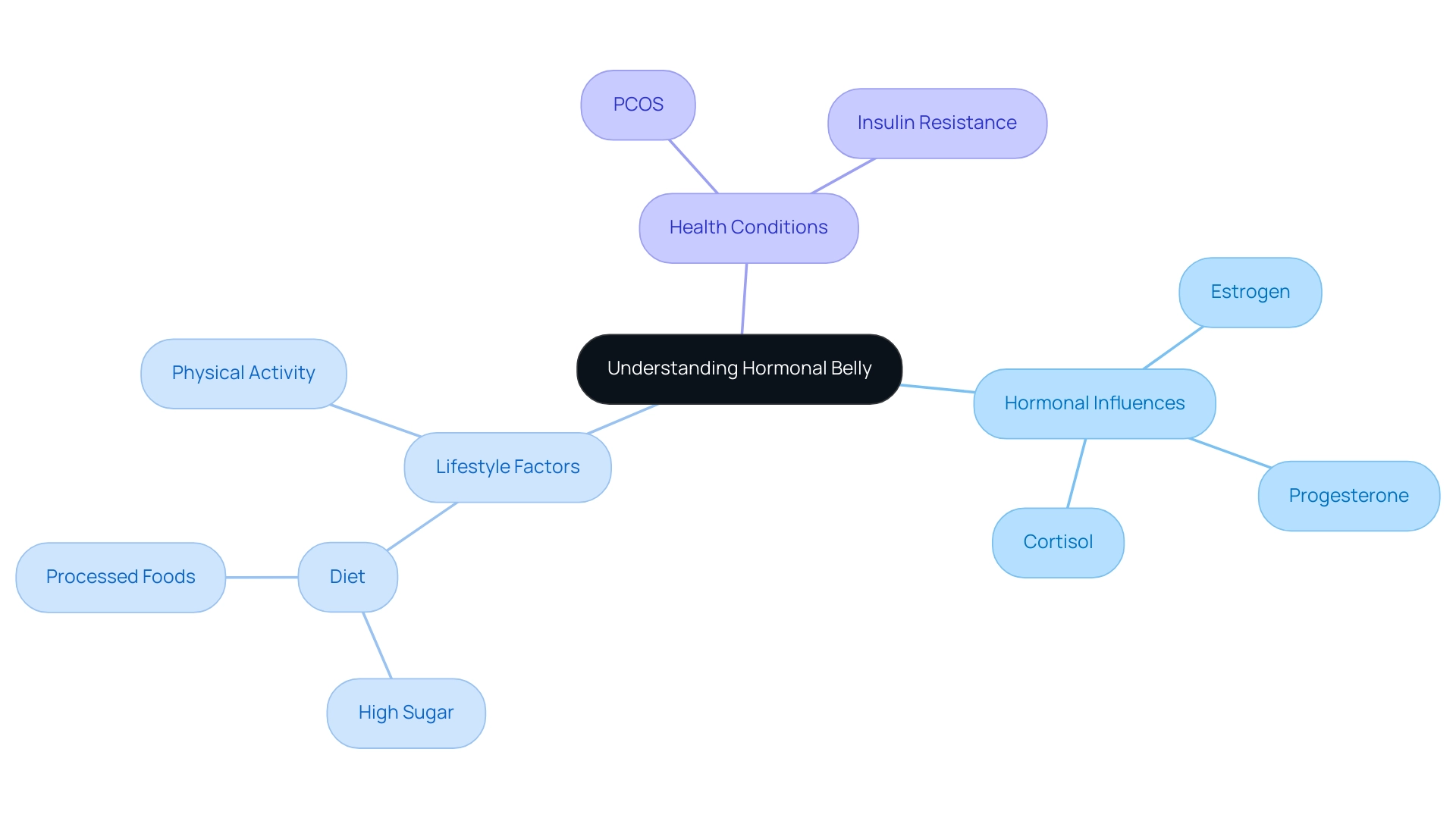
Effective Strategies for Managing and Treating Hormonal Belly
To effectively manage and treat belly fat, consider the following strategies:
- Dietary Changes: Focus on a balanced diet rich in whole foods, including fruits, vegetables, lean proteins, and healthy fats. Reduce sugar and processed foods that can spike insulin and disrupt the balance of hormones.
- Regular Exercise: Incorporate both cardiovascular and strength training exercises into your routine. Aim for at least 150 minutes of moderate aerobic activity weekly, along with muscle-strengthening activities on 2 or more days a week.
- Stress Management: Practice stress-reducing techniques such as yoga, meditation, or deep-breathing exercises. These methods can help lower cortisol levels and improve overall well-being.
- Adequate Sleep: Ensure you get 7-9 hours of quality sleep each night. Poor sleep can negatively affect the balance of hormones and contribute to weight gain.
- Consult a Healthcare Professional: If belly issues continue, think about seeking guidance from a healthcare provider for tailored advice and possible treatments.
Implementing these strategies can lead to notable improvements in your endocrine function and overall well-being.
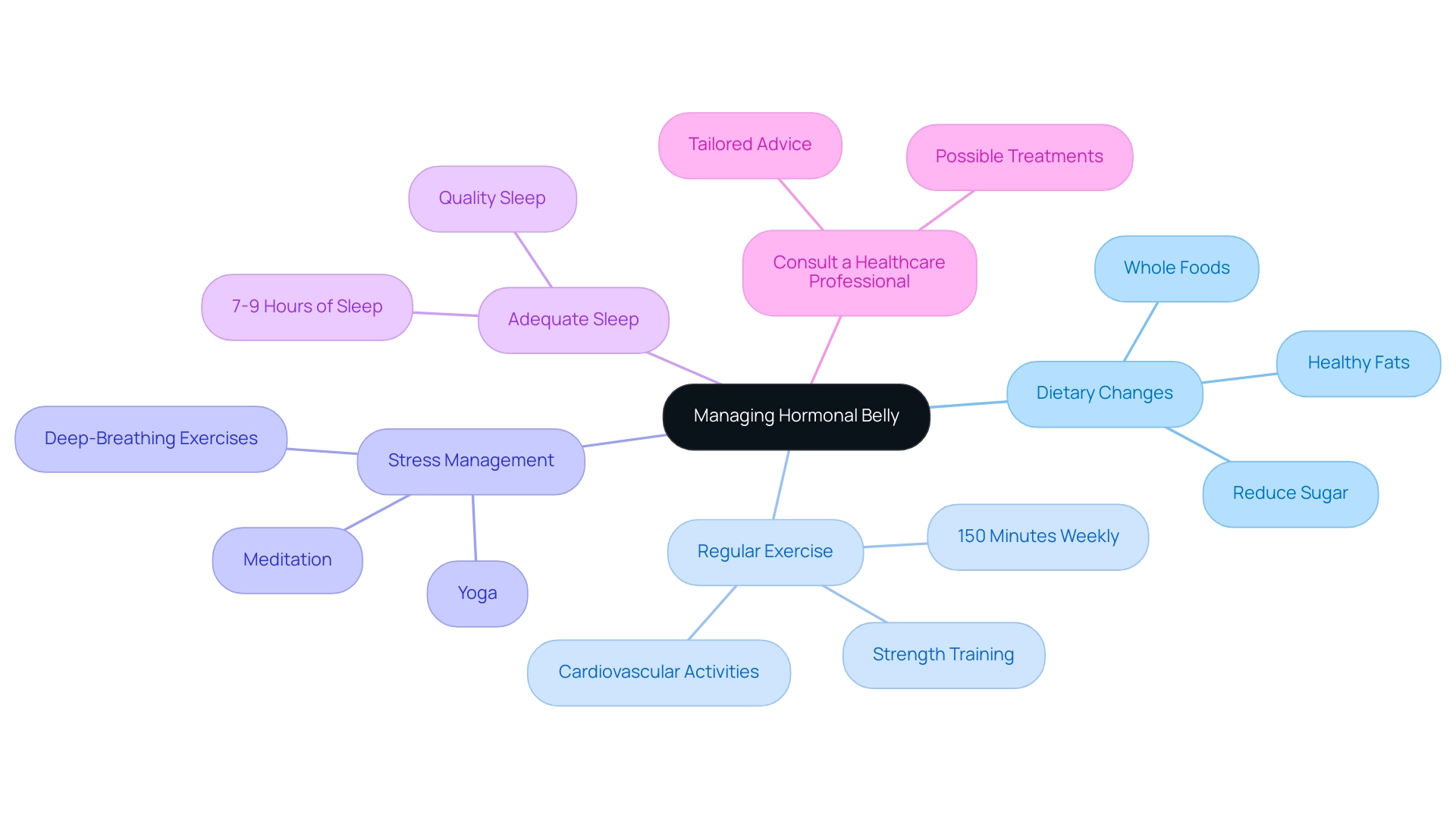
Incorporating Mindfulness and Stress Reduction Techniques
Incorporating mindfulness and tension reduction techniques can significantly influence your hormonal health and promote overall well-being. At Recode Performance, we think that encouraging a healthy lifestyle is crucial for feeling proud and confident while minimizing tension. Here are some effective methods to help you and your team achieve this:
- Meditation: Spend 5-10 minutes daily in meditation to calm your mind and reduce stress. Apps like Headspace or Calm can guide you through the process, helping you focus on your health and future. This practice can also help balance hormones, which is essential for managing belly fat related to hormones.
- Deep Breathing Exercises: Practice deep breathing for a few minutes each day to lower cortisol levels. Inhale deeply through your nose, hold for a few seconds, and exhale slowly through your mouth to relieve tension. Reducing cortisol can directly affect the balance of hormones.
- Mindful Eating: Pay attention to what you eat and how it makes you feel. This practice can help you make healthier food choices and reduce emotional eating, fostering a healthier environment for you and your family. Conscious eating is an essential element in regulating endocrine balance and weight.
- Journaling: Document your thoughts and emotions to address pressure and achieve clarity. This practice can assist you in recognizing triggers that lead to endocrine disruptions, enabling proactive well-being management.
By incorporating these methods into your everyday routine, you can foster a more conscious approach to wellness, ultimately boosting confidence and alleviating stress for a rewarding life.
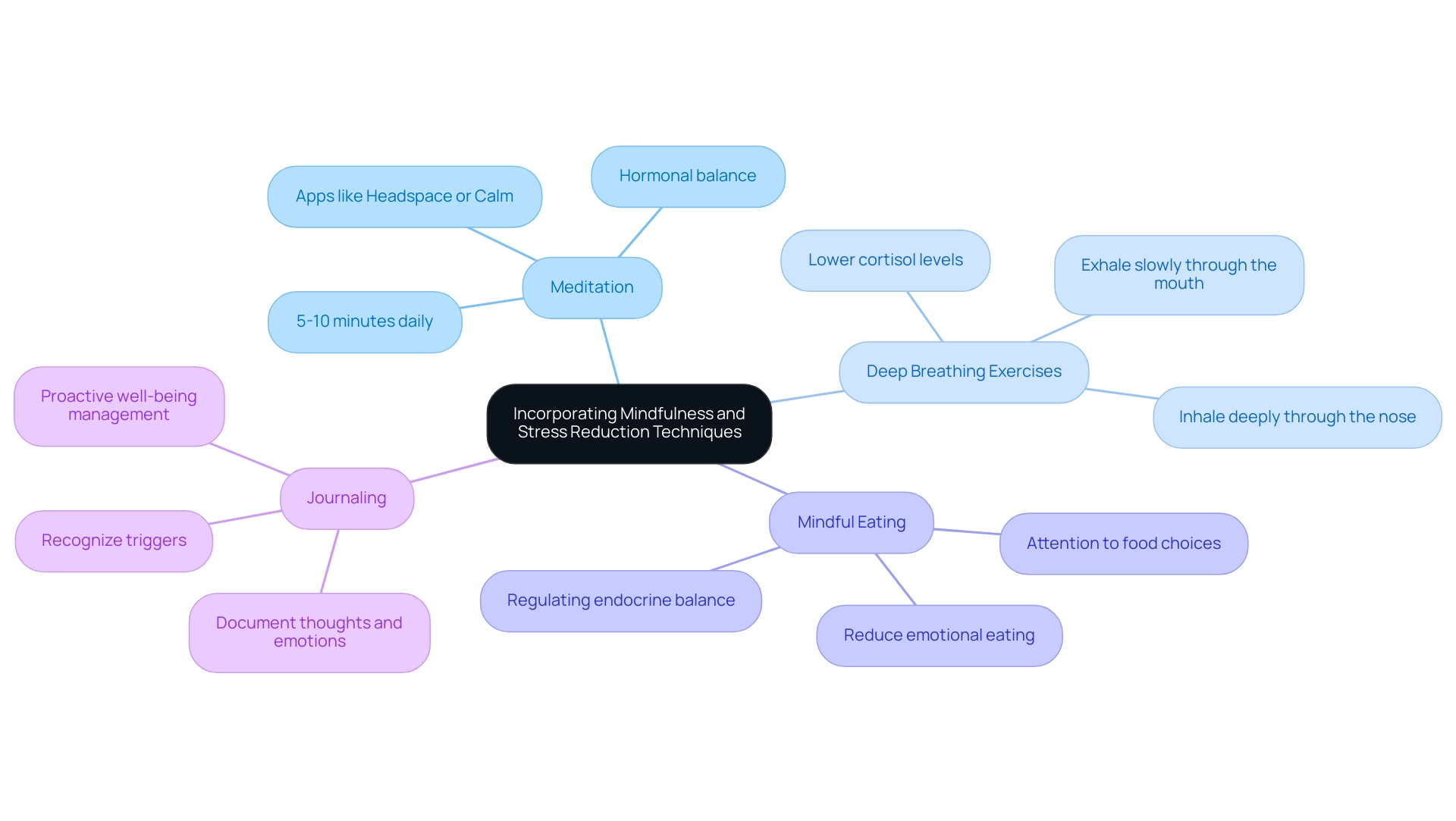
The Role of Nutrition in Hormonal Balance
Nutrition is a cornerstone of endocrine balance. Here are key dietary components to focus on:
- Healthy Fats: Incorporate sources of omega-3 fatty acids, such as fatty fish, flaxseeds, and walnuts, which can help reduce inflammation and support hormone production.
- Fiber-Rich Foods: Eating plenty of fruits, vegetables, and whole grains can improve digestion and help regulate insulin levels.
- Protein: Ensure adequate protein intake from sources like lean meats, legumes, and dairy to support muscle mass and metabolic health.
- Hydration: Drink plenty of water throughout the day to support overall health and endocrine function. Aim for at least 8 glasses a day.
- Limit Caffeine and Alcohol: Both substances can disrupt bodily balance and contribute to stress. Moderation is essential.
By concentrating on these nutritional factors, you can create a supportive atmosphere for balance and overall wellness.
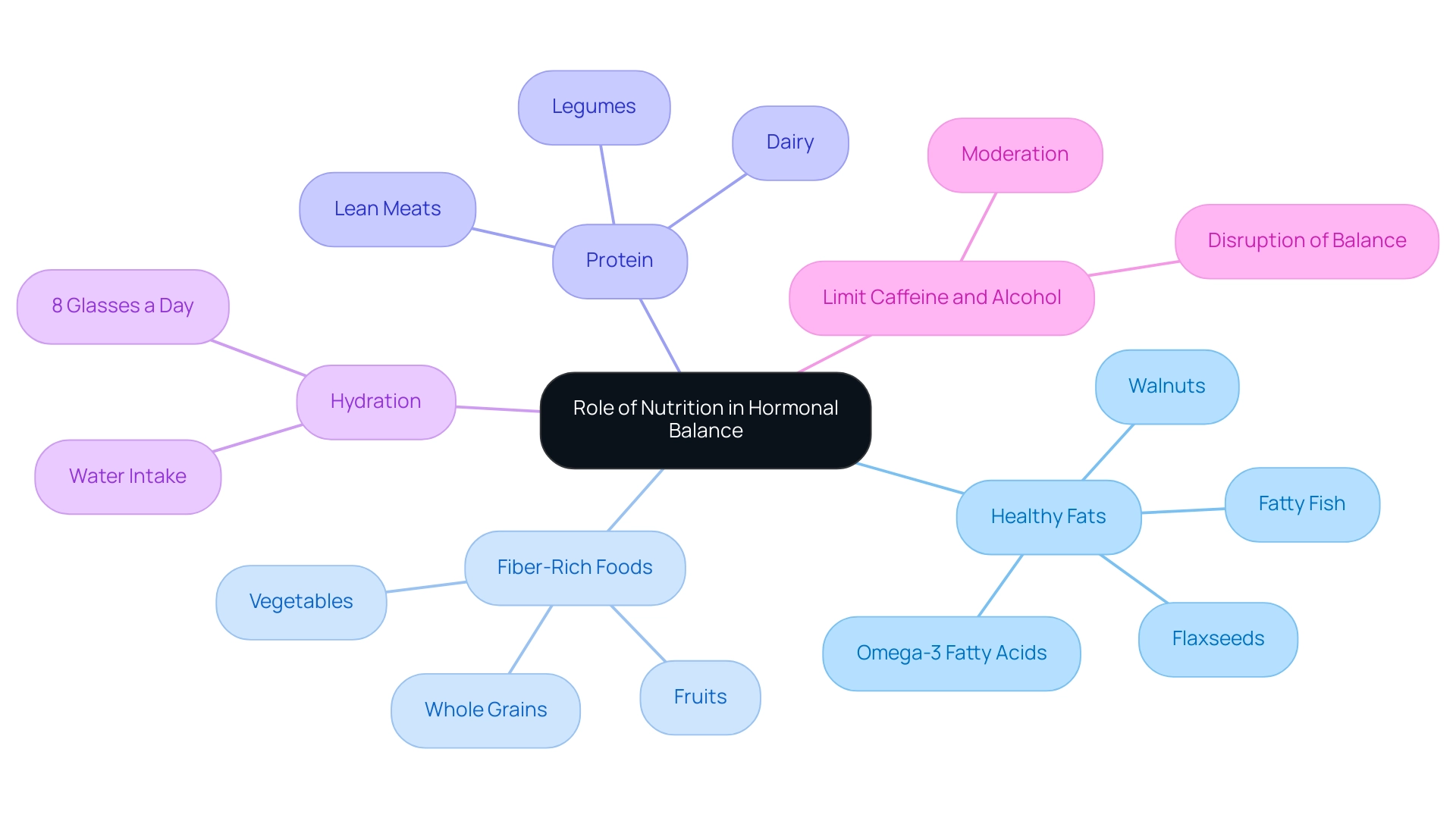
Establishing a Supportive Environment
Establishing a supportive environment is crucial for managing hormonal belly fat effectively. Consider the following strategies to empower your team:
- Join a Support Group: Look for local or online wellness groups where members can share experiences and gain encouragement, fostering a sense of community. Many have found that sharing their journeys leads to lasting lifestyle changes.
- Engage Colleagues: Promote healthy habits among coworkers by organizing group activities like walking meetings or lunch-and-learn sessions on nutrition, which can inspire collective engagement. Evidence indicates that team-oriented methods improve motivation and responsibility.
- Seek Professional Guidance: Collaborate with experienced nutritionists or wellness coaches who utilize evidence-based techniques to provide personalized support and accountability, ensuring tailored approaches to individual needs. Testimonials from clients often emphasize the effectiveness of such personalized coaching.
- Involve Family and Friends: Share wellness goals with loved ones to create a robust support network that encourages healthier choices.
By fostering such an environment, you enhance motivation and commitment to achieving hormonal balance. To further support your team, consider scheduling a consultation with a health coach today to explore personalized strategies that can lead to empowered well-being.
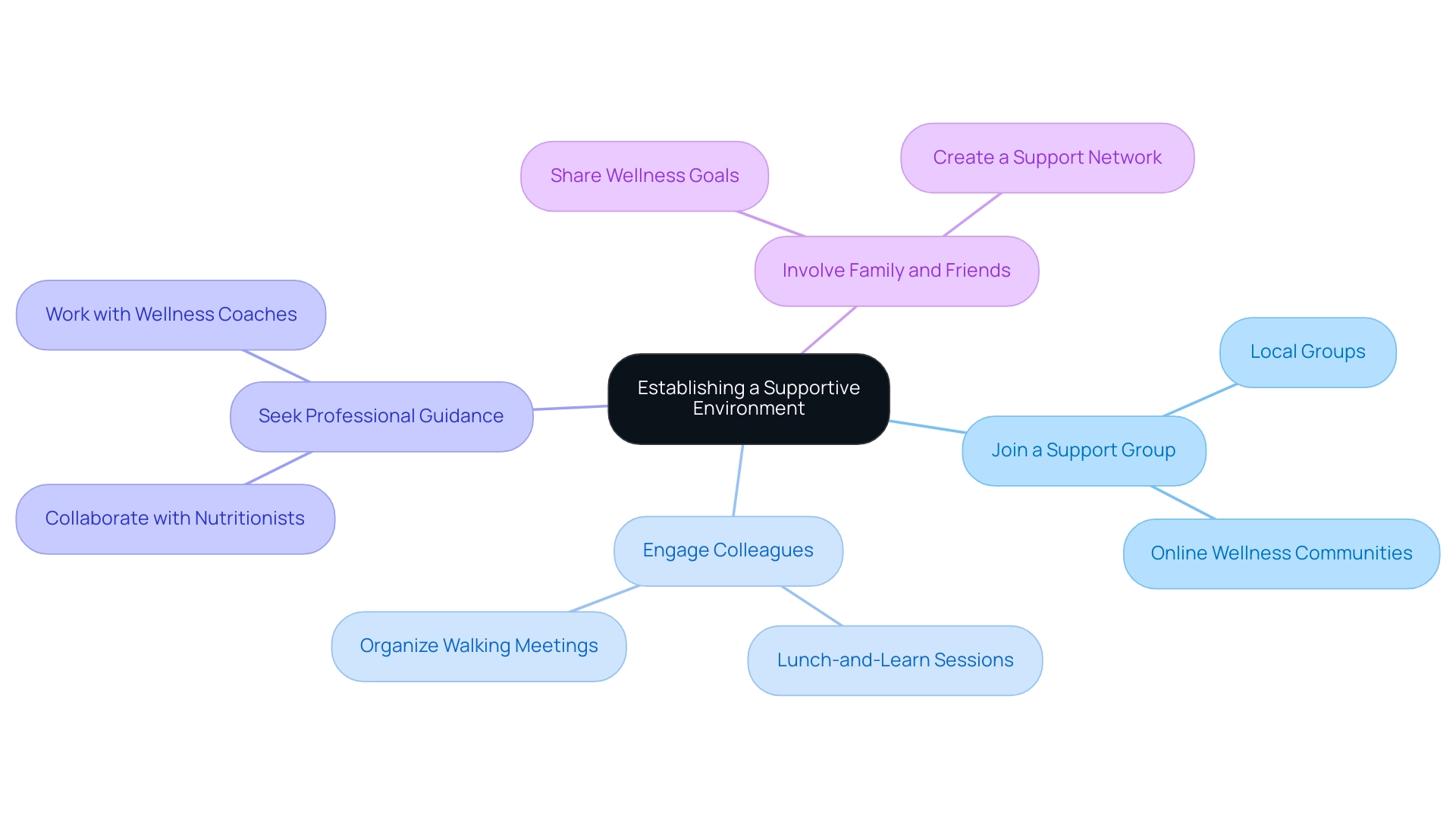
Conclusion
Taking control of hormonal health is not just about aesthetics; it's a vital component of overall well-being. Understanding that hormonal belly is often a symptom of deeper imbalances allows individuals to approach this issue with informed strategies. By addressing the root causes, such as stress, nutrition, and lifestyle choices, it becomes possible to foster a healthier relationship with one's body.
Implementing effective strategies—like dietary adjustments, regular exercise, stress management, and adequate sleep—creates a holistic approach to managing hormonal belly. Mindfulness practices and building a supportive environment further enhance this journey, encouraging individuals to prioritize their health and make sustainable changes.
Ultimately, the path to overcoming hormonal belly is paved with knowledge and proactive steps. By taking action today, individuals can reclaim their health, boost their confidence, and promote lasting wellness. The time to embrace these changes is now, leading to a healthier future for oneself and a positive impact on the community.




